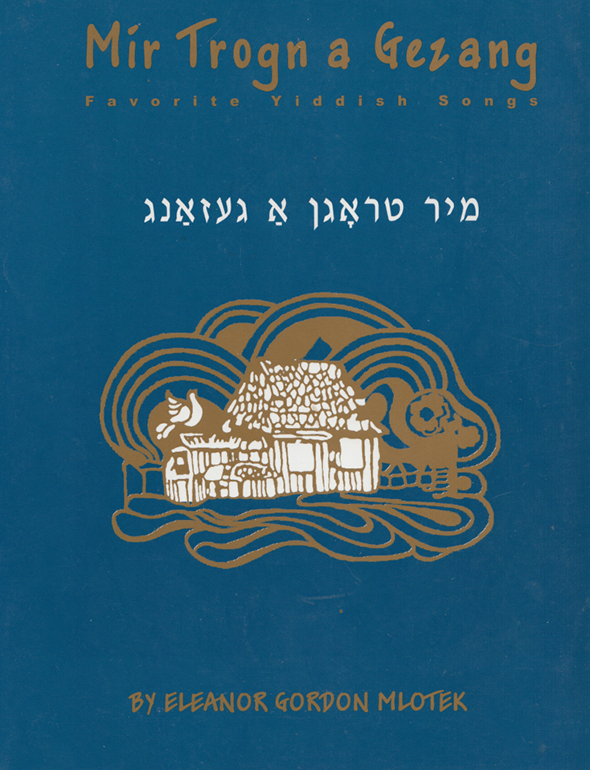This lullaby was written by one of the last popular Yiddish folk poets, Mordkhe Gebirtig (1877-1942), who was killed by the Nazis. Author of the prophetic Es Brent Briderlekh (1938), Reyzele, Motele, Moyshele, Mayn Fraynd, Dray Tekhterlekh, and others, Gebirtig’s songs became immediate hits in the 1920’s. They were sung on both sides of the Atlantic, due largely to their popularization by celebrities of the Yiddish theatre such as Molly Picon. This charming lullaby is part of the standard repertoire of all singers of Yiddish song in the Americas, Soviet Russia and Israel.

Go to sleep now Yankele, my pretty one,
close your dark little eyes.
*Momma still has to sing lull-a-bye
to a little boy who already has all his teeth.
Should a little boy who already has all his teeth,
and will, with luck, soon go to school
to study Torah and Talmud,
cry while his mother sings him to sleep?
A little boy who will study Talmud
(here’s your father, beaming as he hears that!)
a little boy who will grow to be a scholar,
won’t leave his mother be, night after night.
Should a little boy, who will grow to be a scholar
and a talented businessman alike,
a little boy, practically a clever bridegroom,
lie soaking wet as if in a river?
So, go on and sleep, my clever bridegroom,
meanwhile, you are lying in the cradle here with me.
It will cost a lot of effort yet, and mother’s tears,
before a man will be made out of you.
Shlof zhe mir shoyn, Yankele, mayn sheyner,
Di eygelekh, di shvartsinke, makh tsu;
A yingele, vos hot shoyn ale tseyndelekh,
Muz nokh di mame zingen ay-lyu-lyu.
A yingele, vos hot shoyn ale tseyndelekh
Un vet mit mazl bald in kheyder geyn,
Un lernen vet er khumesh un gemore,
Zol veynen ven di mame vigt im ayn?
A yingele, vos lernen vet gemore,
Ot shteyt der tate, kvelt un hert zikh tsu,
A yingele, vos vakst a talmed-khokhem,
Lozt gantse nekht der mamen nisht tsu ru?
A yingele, vos vakst a talmed-khokhem,
Un a geniter soykher oykh tsu glaykh,
A yingele, a kluger khoshen-bokher,
Zol lign azoy nas vi in a taykh?
Nu shlof zhe mir, mayn kluger khosn-bokher,
Dervayl ligstu in vigele bay mir.
S’vet kostn nokh fil mi un mames trern
Biz vanen s’vet a mentsh aroys fun dir.
שלאָף זשע מיר שױן, יאַנקעלע, מײַן שײנער,
די אײגעלעך, די שװאַרצינקע, מאַך צו;
א ייִנגעלע, װאָס האָט שױן אַלע צײנדעלער
מוז נאָך די מאַמע זינגען אײַ-ליו-ליו.
אַ ייִנגעלע, װאָס האָט שױן אַלע צײנדעלעך
און װעט מיט מזל באַלד אין חדר גײן,
און לערנען װעט ער חומש מיט גמרא,
זאָל װײנען װען די מאַמע װיגט אים אײַן?
אַ ײַנגעלע װאָס לערנען װעט גמרא,
אָט שטײט דער טאַטע, קװעלט און הערט זיך צו,
אַ ייִנגעלע, װאָס װאַקסט אַ תּלמיד-חכם,
לאָזט גאַנצע נעכט דער מאַמען נישט צו רו?
אַ ייִנגעלע, װאָס װאַקסט אַ תּלמיד-חכם,
און אַ געניטער סוחר אױך צו גלײַך,
אַ ייִנגעלע, אַ קלוגער חתן-בחור,
זאָל ליגן אַזױ נאָס וױ אין אַ טײַך?
נו, שלאָף זשע מיר, מײַן קלוגער חתך—בחור,
דערװײַל ליגסטו אין װיגעלע בײַ מיר.
ס’װעט קאָסטן נאָך פֿיל מי און מאַמעס טרערן
ביז װאַנען ס’װעט אַ מענטש אַרױס פֿון דיר.
Song Title: Yankele

First published in 1972, Mir Trogn A Gezang: Favorite Yiddish Songs was reprinted six more times (in 1977, 1982, 1985, 1987, 1988, 2000) due to popular demand. The songs in this anthology represent a sampling of beloved folk and well-known Yiddish songs, many of which are scattered in various song collections; some appear in very rare and inaccessible collections; and some were never before published. Folk songs comprise about a third of this volume and were selected mainly on the basis of popularity and sometimes for their historic significance. Needless to say, they are only representative of the vast, rich treasure of Yiddish folk material. The selection was made not only on the basis of personal preference, but in the knowledge they are favorites of many who sing these songs. Most of the songs represent the repertoire that was sung at Yiddish summer camps, May 1st demonstrations and at social gatherings. Many songs were introduced to American Jewry by Jewish immigrants who came to the United States after World War II, for whom these songs had been favorites in Poland and other East European communities destroyed by the Nazis.